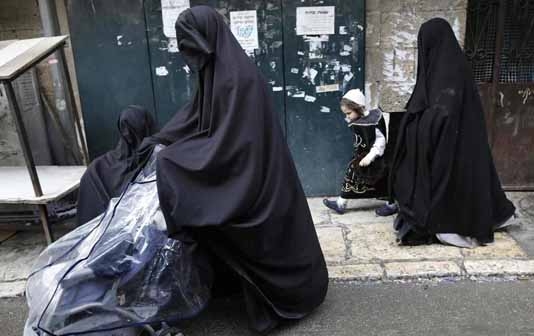Ultra-Orthodox Jews fight domestic violence in Israel

“If you are scared, that is not shlom bayit,” reads the slogan that Esty Shushan hopes will encourage religious Jewish Israeli women like her to leave violent marriages.
The phrase, which literally translates as “peaceful home”, is vitally important in Judaism — meaning an obligation to protect the unity of the family.
Shushan, 42, is making sure to frame her organisation’s campaign in the language of her ultra-Orthodox community, which makes up around 10 percent of Israel’s population.
Seven years ago, driven by high levels of gender inequality in her community, Shushan co-founded an association to improve ultra-Orthodox women’s visibility and political representation.
Called Nivcharot, meaning “The Chosen”, it now has around 15,000 supporters.
Ultra-Orthodox Jews live in close-knit communities often closed off to the wider world, with patriarchal family structures common.
Shushan and her colleagues hope that ultra-Orthodox women will be more comfortable opening up to others from their own community.
In a room in an educational centre in the city of Kfar Saba north of Tel Aviv in central Israel, they meet to finalise their new campaign.
Hair hidden under hats or wigs, they wear long clothes that cover their elbows and knees, preserving their modesty in the traditional way for ultra-Orthodox Jews.
Over pizza and soft drinks, they strategise how best to encourage victims to speak out.
– Rabbi first –
Violence against women occurs throughout Israeli society, said Mally Shechory Bitton, a couples therapist and professor at Ariel University in the Israeli settlement of Ariel in the occupied West Bank.
But in ultra-Orthodox communities there is also a taboo on discussing it, she said, with a feeling that you “shouldn’t wash your dirty linen in public”.
“Orthodox women turn to the rabbi before turning to the police, which also makes the phenomenon of domestic violence difficult to quantify,” she said.
Abuse is not only physical but can be psychological, sexual and even economic, she added.
In ultra-Orthodox communities, men tend to focus only on reading sacred Jewish texts, often relying on women to earn a salary.
Despite this, sometimes “women have their credit cards taken by their husbands,” Shechory Bitton said.
Attitudes have evolved, however, and two shelters for abused religious women have opened in recent years.
“Awareness is growing but it is still not enough,” Shechory Bitton said.
– Spilled wine –
Back in Kfar Saba, Shushan and her colleagues hunch over a computer selecting images to distribute for the International Day for the Elimination of Violence Against Women on November 25.
They are careful to maintain conservative social norms, and avoid images directly depicting gender-based violence.
Instead they choose a photo of wine spilled on a white tablecloth accompanied by the shlom bayit slogan, hinting at violence during the traditional weekly Shabbat dinner.
Shushan hopes the campaign can educate women “not to stay in unhealthy relationships”.
Raheli Morgenstern, 31, another member of the organisation, said religious women are taught from an early age the importance of the sanctity of the home.
This can lead, she said, to abused women staying silent over fears of ostracisation or “shame”.
“Marriage is sacred for Jews and the ultra-Orthodox in particular, but you shouldn’t stay married at any cost,” she said.
Morgenstern says divorce, even if it is permitted under Jewish law, often has “a very, very high price,” with ultra-Orthodox women who pursue separation often excluded from their community.
Nivcharot’s campaign will be shared on WhatsApp and social media.
Contrary to the popular belief that the internet is taboo for ultra-Orthodox Jews, about 40 percent of the community in Israel have online access, fellow member Hila Hassan Lefkowitz said, citing studies she has read.
For all their planning, they have modest hopes for the campaign, Morgenstern said.
Even if they only encourage one woman to end an abusive relationship, she said, “it would be enough”.
